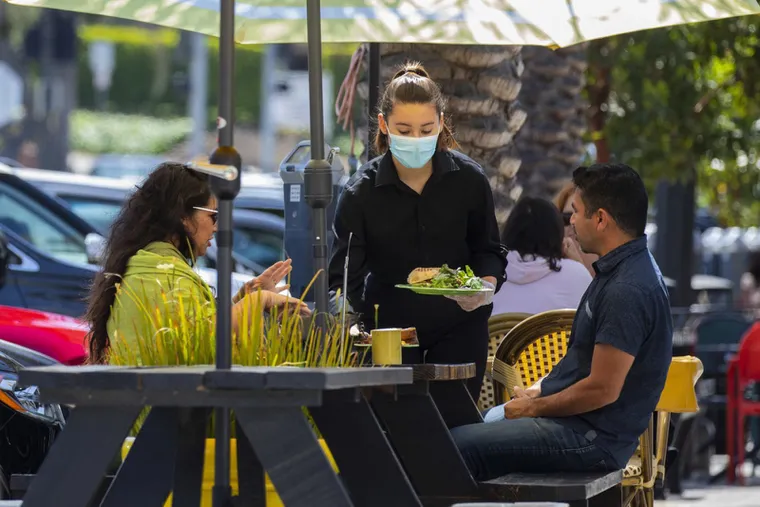Restaurant workers are quitting in droves. This is how they are being lured back. – The Philadelphia Inquirer

Just a few years ago, snazzy restaurant perks included a shift drink at the eveningâs end and maybe a crack at the rib-eye declared âdefinitely not medium-rareâ by a diner. No retirement benefits, health plans, or team-building retreats.
The Great Resignation is upgrading restaurant industry benefits and perks.
Restaurant owners are offering shorter workweeks, life insurance, mental health services, college tuition, and more paths to career advancement. They are giving out free Spotify subscriptions, adding nursing stations for lactating employees, and promising signing bonuses and free food to anyone off the street who fills out an application.
Sandy Cheek has worked as a server and trainer for Crabby Billâs in Pinellas County, Fla., for more than 30 years. Sheâs seen customers grow more impatient during the pandemic, and dozens of colleagues quit, leaving the staff chronically shorthanded. Sheâs been recruited by other restaurateurs, but sheâs staying put because of higher pay and new benefits like life and health insurance. There are also sweet little pick-me-ups, like when the boss hired the Krazy Ice Cream truck to swing by.
âPerks like that make us feel like they appreciate us, that they are giving back to us,â she said. Her free salted caramel swirl was hardly enough to cement her loyalty. But it has strengthened this feeling that the owners are going the extra mile. âIâm going to keep going,â she said.
While there has always been high turnover in the industry, restaurants, in particular, have been ravaged by some of the largest numbers of employees quitting in the Great Resignation sweeping the labor force in recent months.
Workers are stepping away from the industry for good reasons, said Zulma Lowery, 44, a chef and single parent in the Bronx. She said the pandemic exposed how precarious hospitality work has always been.
Working in kitchens at Interboro Spirits and Ales in Brooklyn and a Black-owned beer bar in Harlem called Harlem Hops, Lowery has seen the unusual addition of paid sick leave and paid vacation, but itâs not enough for her. The ownersâ frenzy to find ways to survive each coronavirus wave left her work schedule in flux and hours slashed at the last minute with little predictability as well as diminished tips. She quit.
âCulture in the industry has changed, is still changing, and I think itâs not getting any better,â Lowery said. These days, with her house filled with balloons, sheâs trying to make a go of catering and hosting birthday parties and showers. âIâve got a gender reveal at 3 p.m. today.â
In 2021, restaurant jobs advertised on ZipRecruiter only received about 18 applicants on average, down from 61 back in 2019, said ZipRecruiter chief economist Julia Pollak.
Now, restaurant manager and cook job ads get around 40% fewer applications than the industry-wide average, she said. With restaurant employers competing for far fewer applicants, new enticements have become common, she added.
In response, 84% of restaurants reported raising wages, according to the National Restaurant Association, with hospitality industry workers now earning an average of $19.57 per hour, a 13% increase from a year ago, according to data from the Bureau of Labor Statistics.
Still, restaurant workers are restive, switching jobs, leaving the industry, and demanding compensation and perks that would have been inconceivable two years ago.
Sweetgreen now offers health, dental, and vision benefits, even for part-time employees, as well as five months paid parental leave. Gusto 54 Restaurant Group advertises health insurance and wellness benefits. Fannyâs Restaurant in Los Angeles has disability and life insurance, pet insurance, and identity theft protection for employees.
Some Chick-fil-A operators are now offering average wages of $19 per hour, said spokeswoman Jackie Jags, in many cases a jump from around $15 an hour before the pandemic. Some have added other perks. Justin Lindsey, a store owner in Kendall, Fla., has started offering three-day workweeks to help employees with work-life balance.
Lisa Dribben, who owns six McDonaldâs restaurants in the Dallas suburbs, has hired and lost hundreds of workers over the past two years. During the holidays, she gave her hourly managers jackets and other McDonaldâs-branded clothing as well as bonuses. In addition to employee meals, her workers have gotten $20 each week to spend on food to take home to their families during the pandemic. Workers who get sick with COVID-19 get a bag of groceries delivered to their homes. She now provides reviews and raises every six months.
Yet there have been times she doesnât have enough people, so sheâll close the lobby, put up a sign that says, âWe will reopen shortly,â and focus on drive-through only.
Many restaurants are adding benefits not traditionally offered in the industry. According to a recent survey of 1,200 restaurants by the Independent Restaurant Coalition, nearly 40% have added paid sick leave for the first time, and more than 20% have added paid vacation during the pandemic.
The Big Quit has spurred companies like Brinker International, which owns Chiliâs and Maggianoâs, to execute âa full-court press to hire, train, and retain our talent,â said Rick Badgley, an executive vice president for the restaurant group.
This means giving out raises and retention bonuses. But they are also experimenting with a program in one region to offer prepaid child care to employees for a $10-per-day copay while expanding another program to help workers earn high school equivalency degrees and associate degrees, even if they are part-time employees.
Benefits more commonly seen in professional jobs, such as signing bonuses, referral bonuses, and retention bonuses for employees who stay, are also becoming more common at restaurants. Before the pandemic, only 2% of industry jobs were advertised with a signing bonus. Now, itâs 12%, said Pollak of ZipRecruiter.




